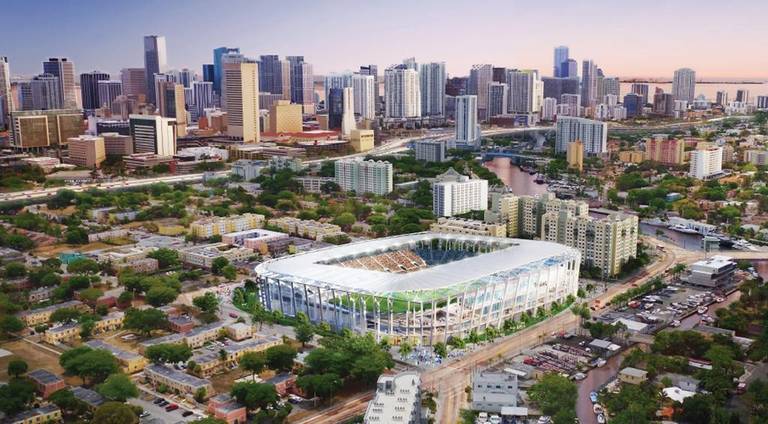Note from Storm: Urban sports stadiums in in the United States traditionally suffer from two major problems:
- Billionaire franchise owners bribe or bully local officials into giving them massive amounts of public money to subsidize their private, for-profit venture. They justify it by promising that the stadium will have a revitalizing effect on the neighborhood, or the city as a while. This promise has seldom been kept, and dozens of cities have been left with a huge, devitalized hope in their city center.
- Even when the stadium is successful, they are generally automobile-oriented. They thus create traffic headaches before and after games, and they often dedicate acres of prime real estate to a wasteful parking function.
Now, in Miami, British-born David Beckham has a decidedly un-American idea: no cars, no bribes, no corporate handouts. It’s an urban soccer stadium with no parking, and no public subsidies. What a concept.
Excerpt from Miami Herald article
“We’re going to be encouraging the use of Metromover, Metrorail, water taxis, ride-sharing,” said Spencer Crowley, a lawyer and lobbyist representing Miami Beckham United in its talks with Miami-Dade to buy a parcel needed for its nine-acre stadium site near the Miami River. “We view this as a paradigm shift for the county as to how people get to large events.”
To address parking concerns, Tim Leiweke, Beckham’s top negotiator, unveiled a strategy he said would help keep cars away from the stadium area. He said the team plans to arrange for a dinner-cruise boat to deliver fans to the Miami River a few blocks away, and would arrange for shuttle buses from parking garages in Miami. The team plans to secure at least 2,000 spaces a game, he said. The main focus would be on the nearby Metrorail station, with the Beckham group relying on soccer’s tradition of fans “marching” to the game.
John DeLeon, a Spring Garden resident, argued soccer could help Overtown lead the way in embracing public transit. “It’s going to help redefine who we are a community,” he said. “We’re going to be a pedestrian community.”
Miami Beckham United would own its stadium site, and is not pursuing the county subsidies pledged to Miami-Dade’s exiting three professional sports teams. “Every penny spent will be ours,” Leiweke said.
Image courtesy of MLS Miami.
See full Miami Herald article by Douglas Hanks and Martin Vassolo.

